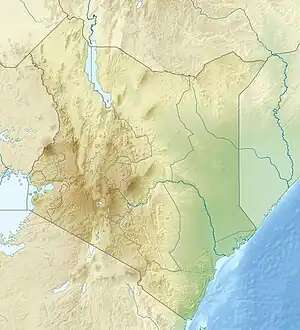Menengai
Menengai Crater is a massive shield volcano with one of the biggest calderas in the world, in the Great Rift Valley, Kenya. It is the largest volcano caldera in Kenya and the second largest volcano caldera in Africa.[1] Volcanic formed rich loam soils enrich the adjacent farmland arounds its flanks. The crater is on the floor of the Rift Valley. The volcano formed about 200,000 years ago and the prominent 12 x 8 km caldera formed about 8000 years ago. The caldera floor is covered with numerous post caldera lava flows. The Menengai volcano is considered one of the best-preserved Krakatau-style calderas in the world.[2] Menengai has very little sediment in the caldera which is a thick mass of lava boulders and inaccessible ridges. [3] Volcanic activity continues [4] and a current project under the GDC is at an advanced stage towards geothermal power generation.[5]
| Menengai | |
|---|---|
 Menengai Crater - view from the edge | |
| Highest point | |
| Elevation | 2,278 m (7,474 ft) |
| Coordinates | 0°12′S 36°04′E |
| Geography | |
 Menengai Location in Kenya | |
| Location | Kenya |
| Geology | |
| Mountain type | Shield volcano |
| Last eruption | 6050 BCE (?) |
| Climbing | |
| Easiest route | via taking the north east route for bus |
Menengai is 10 km (6 mi) north of Nakuru, the fourth-biggest city in Kenya.
References
- "Menengai Crater". Archived from the original on 22 February 2015. Retrieved 28 February 2015.
- Seach, John. "Menengai Volcano - John Seach". www.volcanolive.com. Retrieved 28 February 2015.
- "Menengai Crater". Archived from the original on 22 February 2015. Retrieved 28 February 2015.
- "Menengai Crater Kenya / Rift Valley / Nakuru /". wikimapia. wikimapia. Retrieved 28 February 2015.
- OBWOCHA, BEATRICE. "Menengai crater to become active again". Retrieved 28 February 2015.
See also
- "Menengai". Global Volcanism Program. Smithsonian Institution. Retrieved 2020-04-01.